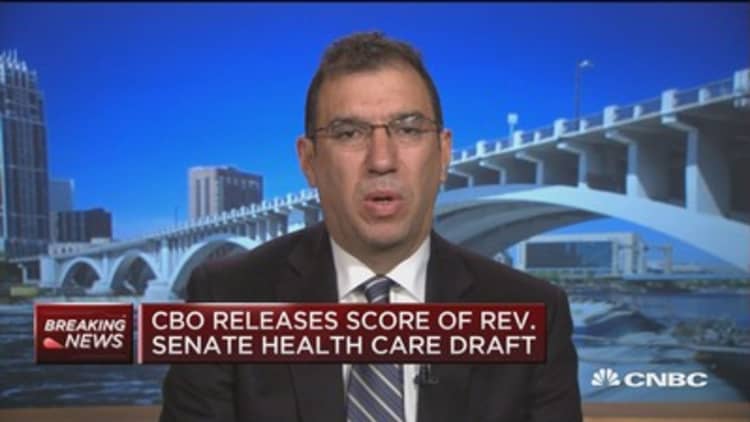
If you depend on Medicaid to supplement the cost of care for your special needs child, now is the time to reassess your long-term plans.
Some 11.2 million children in the U.S. have special needs — and of these, nearly 5 million rely on coverage from Medicaid and its Children's Health Insurance Program, according to the Kaiser Family Foundation.
Now, funding to those programs is imperiled as the House and Senate debate their health-care bills. The House proposal, the American Health Care Act, would reduce Medicaid spending by $834 billion from 2017 to 2026, according to the Congressional Budget Office.
Meanwhile, under the Senate bill, known as the Better Care Reconciliation Act, federal spending on Medicaid would decrease by $772 billion from 2017 to 2026, according to the Congressional Budget Office. The bill phases out Obamacare's Medicaid expansion program.
Medicaid isn't limited to doctor's visits and lab work. These benefits also include physical, occupational and speech therapy, nurses for people with chronic conditions, home- and community-based services.
"More than likely, parents of children with special needs may come to the conclusion that they can't rely on benefits, and they will have to be proactive," said Russell J. Fishkind, an estate planning attorney and partner at Saul Ewing in Princeton, New Jersey.
If you have a special needs child, now might be the time to reassess your long-term plan and secure additional funding in the event the Medicaid income you needed is no longer there.
Maximizing aid
Medicaid and Supplemental Security Income are instrumental in special needs planning, but beneficiaries face "means testing" in order to qualify for these benefits.
Individuals with more than $2,000 in assets and couples with more than $3,000 won't qualify for the SSI program.
This year, the monthly maximum for SSI benefits is $735 for an eligible individual and $1,103 for a couple. In most states, a child eligible for SSI can also obtain Medicaid to cover medical services and special health care needs.
To maximize available resources, family members can set up a third-party special needs trust and fund it with assets that aren't owned by the child, including life insurance and other property.
This way, the child is still eligible for SSI and Medicaid benefits. Upon his or her death, assets remaining in a third-party special needs trust can go to other family members or to charity.
A benefit of the third-party special needs trust — which is also known as a supplemental needs trust — is that assets that remain after the demise of the disabled individual do not have to be paid back to Medicaid.
This is because the assets never belonged to the beneficiary in the first place.
On the other hand, in a self-settled special needs trust — which holds assets that belong to the beneficiary — Medicaid will need to be reimbursed after the disabled person's death.

A good example would be how the Fernandez family of Newton, Massachusetts, used life insurance and a special needs trust to cover the $3 million lifetime cost of care for their 23-year-old son, Alex, who has autism. (See video above.)
Filling in the gaps
Estate attorneys are encouraging clients to review their special needs trusts and ensure they allot more money toward the care of their disabled children.
This can help make up for any shortfalls in the event federal funding is slashed.
More than likely, parents of children with special needs may come to the conclusion that they can't rely on benefits, and they will have to be proactive.Russell J. Fishkindestate planning attorney and partner at Saul Ewing
"Look at your life insurance and think about allocating larger portions of your estate to the child with the disability," said Michael Gilfix, an estate planning attorney at Gilfix & La Poll Associates in Palo Alto, California.
To maximize your child's protection, consider increasing the death benefit of the life insurance policy that's held within your special needs trust. This can help contribute to any funding that might be lost during Medicaid cuts.
Revisit your life care plan
Now is a good time to build or revisit your life care plan, a document that details your child's medical needs, social circles, successor trustees and income needs.
If you're new to special needs planning, here's where to begin, according to Fishkind.
Establish your team: Paying for care with a variety of assets can get complicated quickly, so you may want to coordinate with a team of experts, including an estate planning attorney, an accountant and a life insurance professional.
Create a life care plan: To provide your loved one with the best care, draft a document that will list his or her medical needs, social circles, dietary needs and the successor trustees involved. Detail the financial resources available, too.
"Many individual trustees are concerned about assuming responsibilities for a loved one," said Fishkind. "If you show them the resources are there and give them directions to dispense their fiduciary duty, it's not as daunting."
Review your beneficiary designations: The biggest mistake you can make is to name your special needs child as the beneficiary of a qualified plan or life insurance policy, as this will hurt his or her ability to get government aid.
"We've seen a tremendous shift from the Obama administration to the Trump administration in goals and objectives for providing health-care plans," Fishkind said.
"You need to take matters into your own hands," he said.


